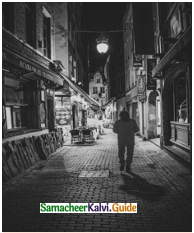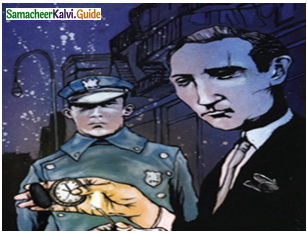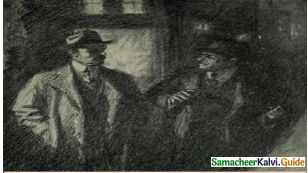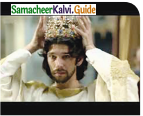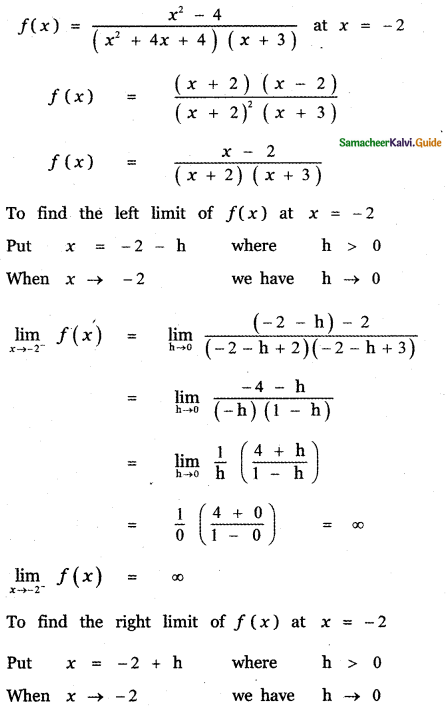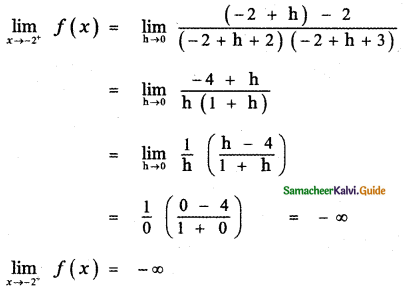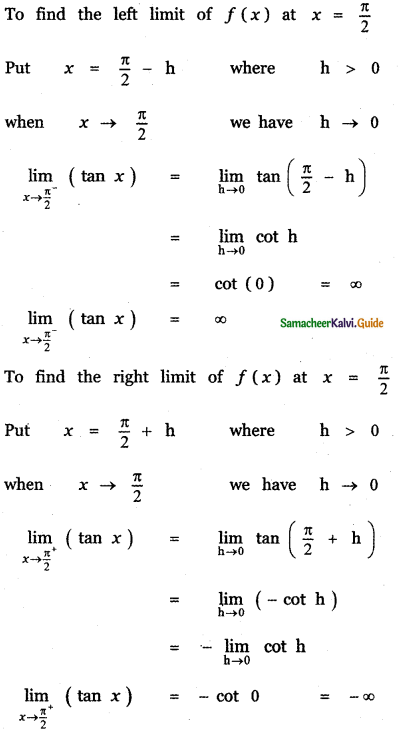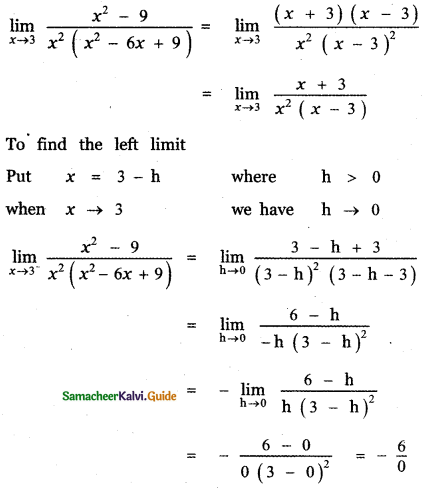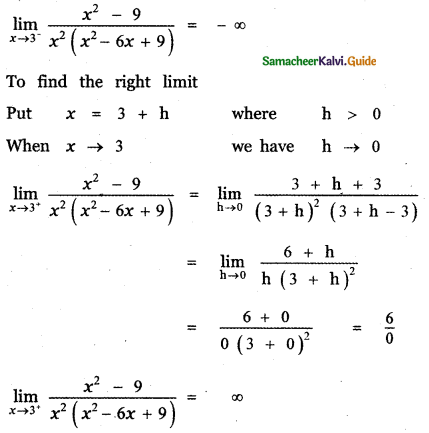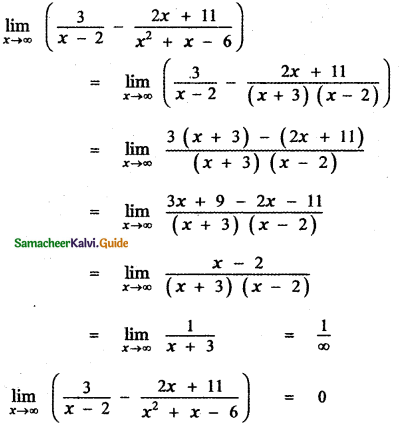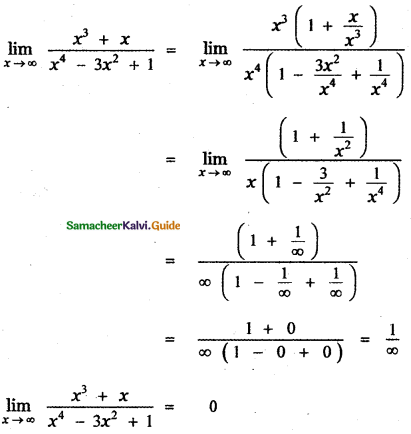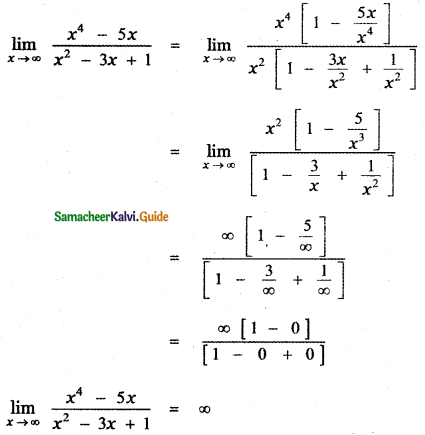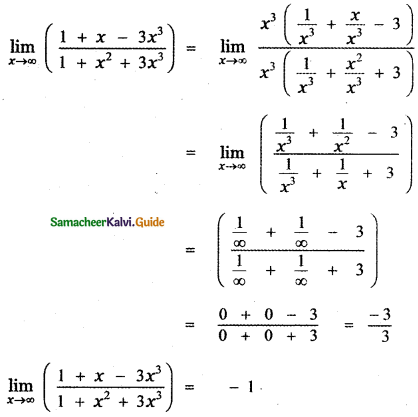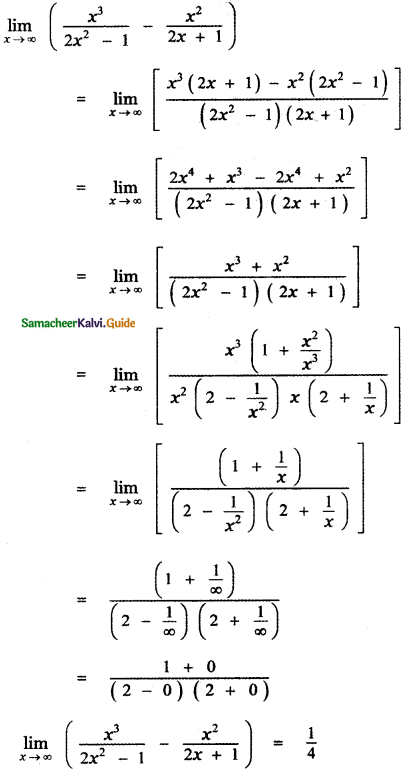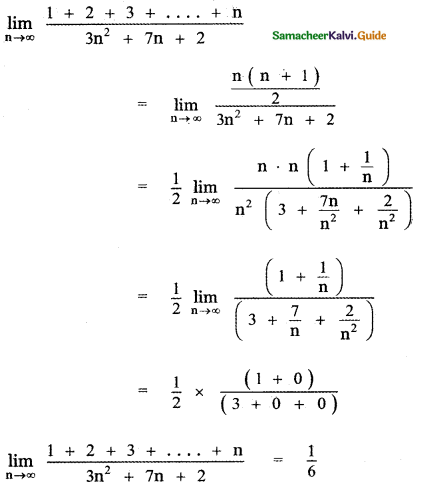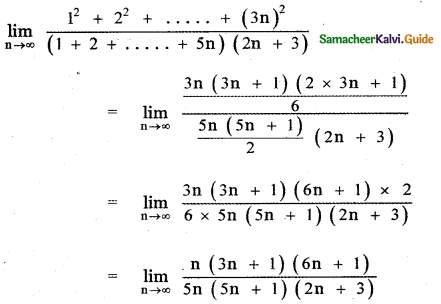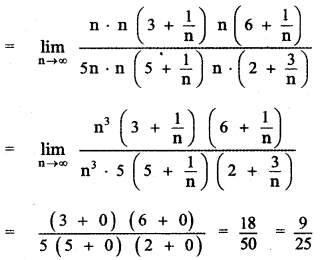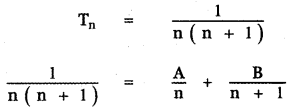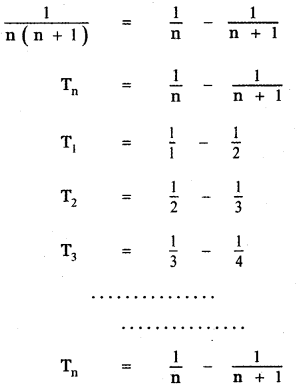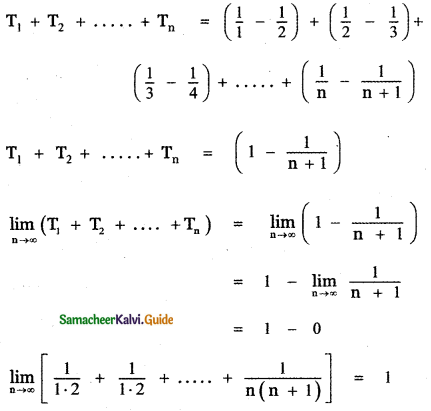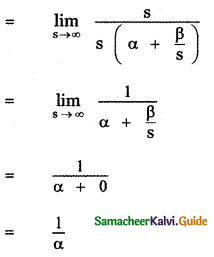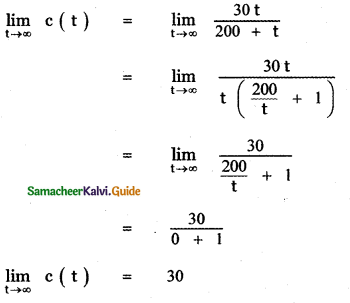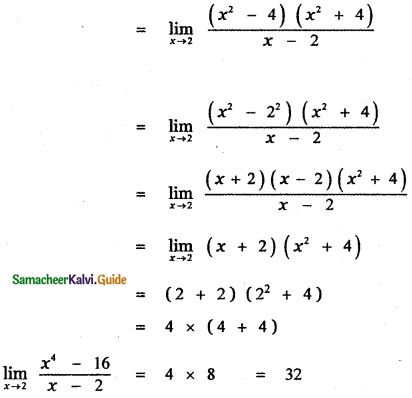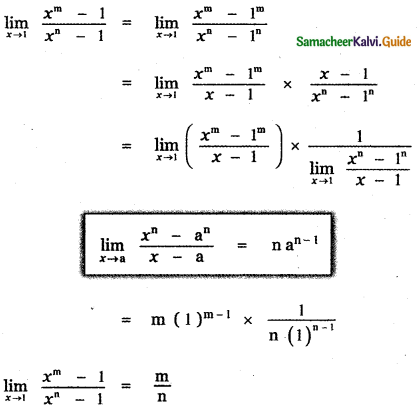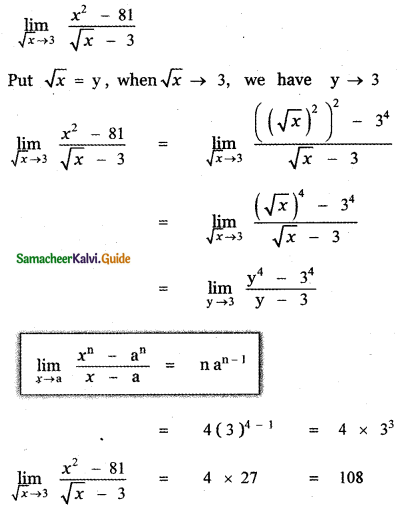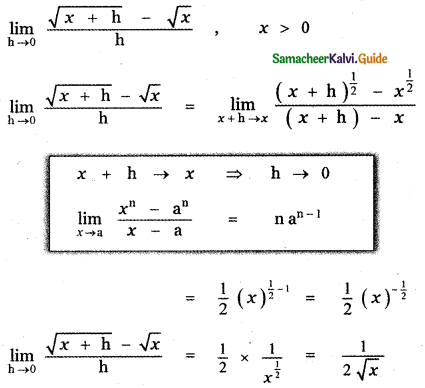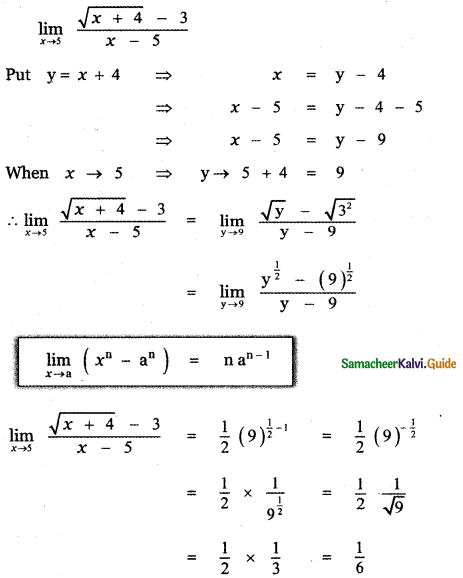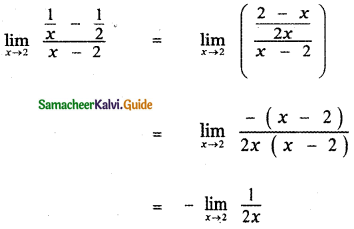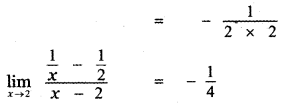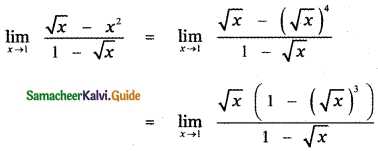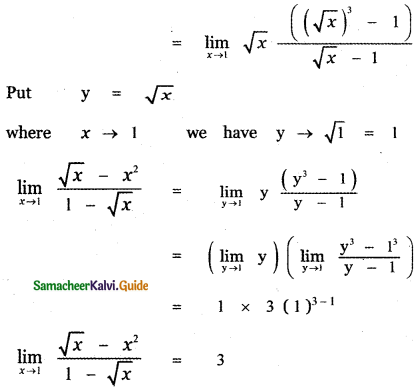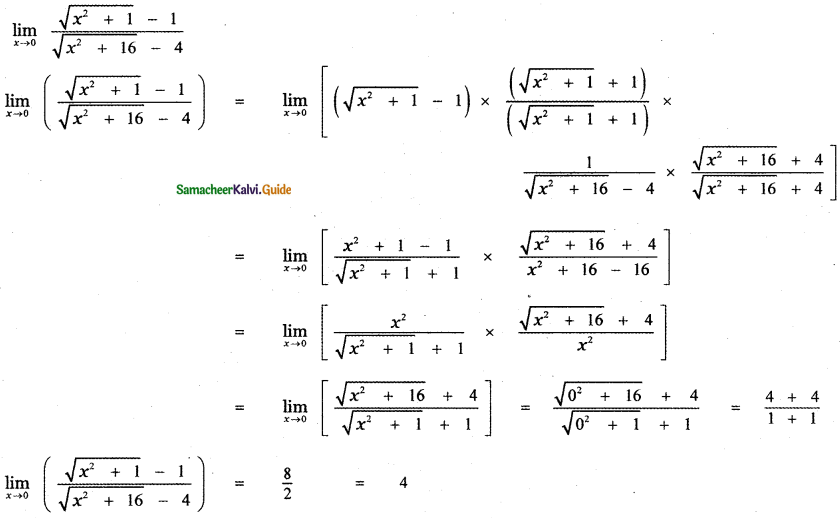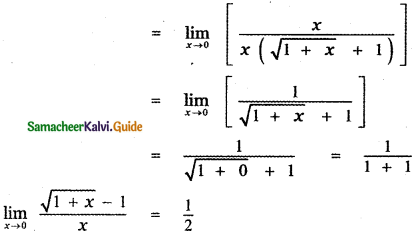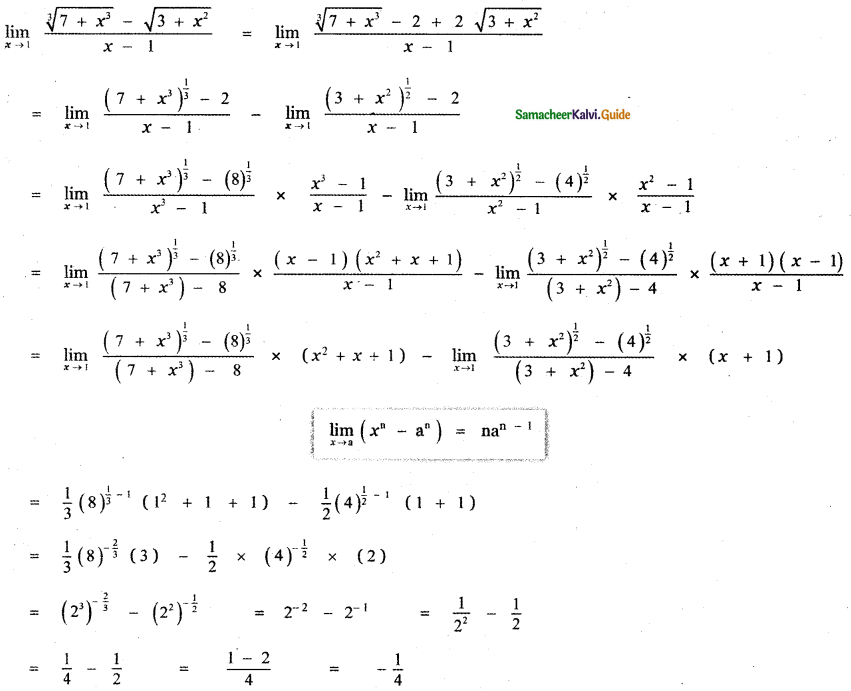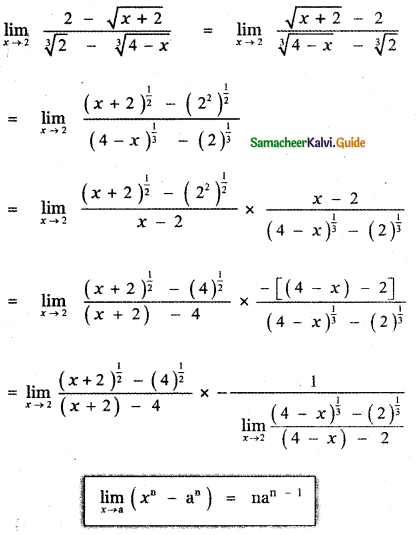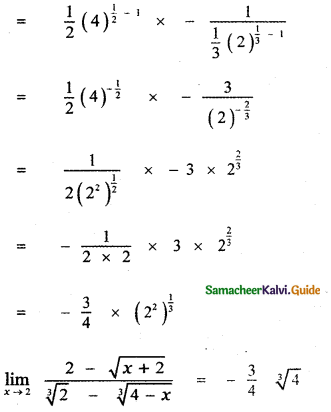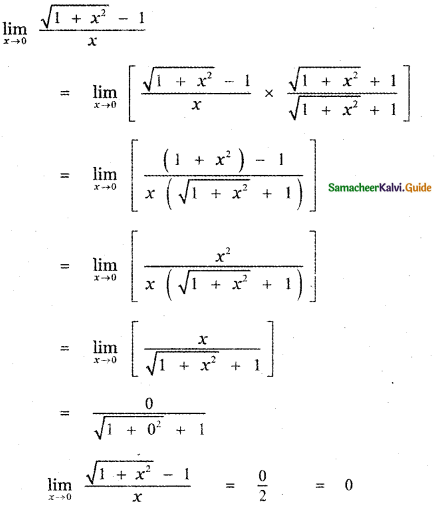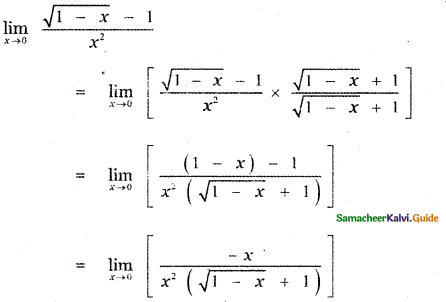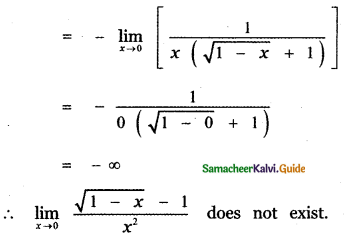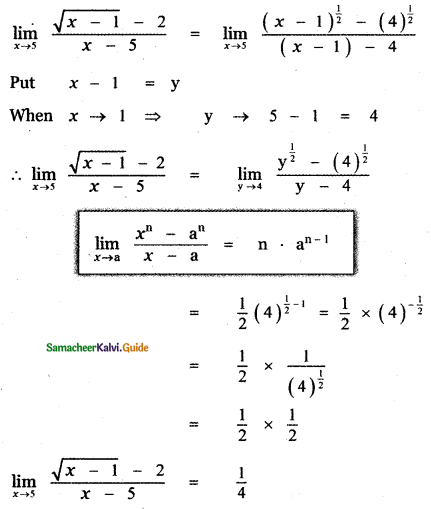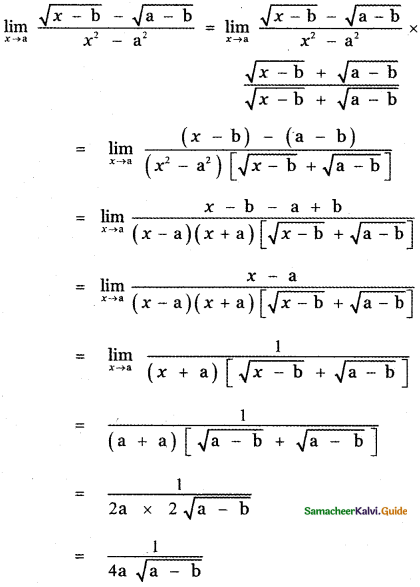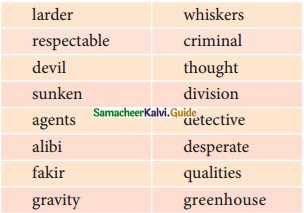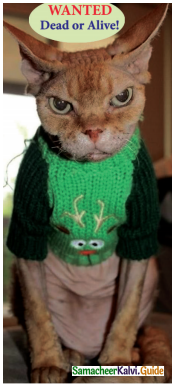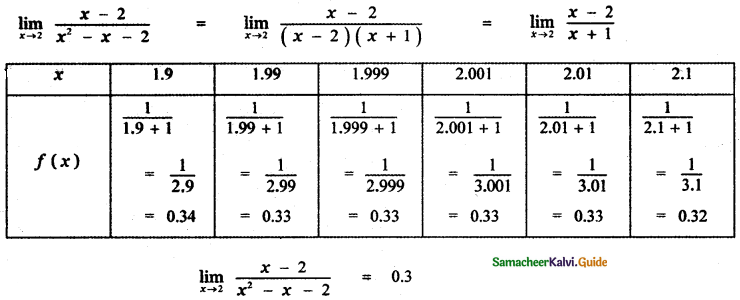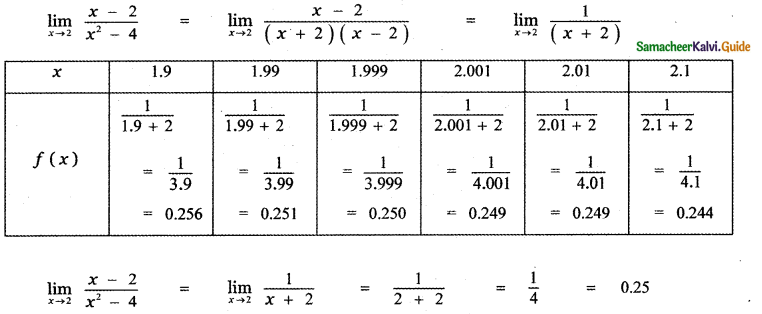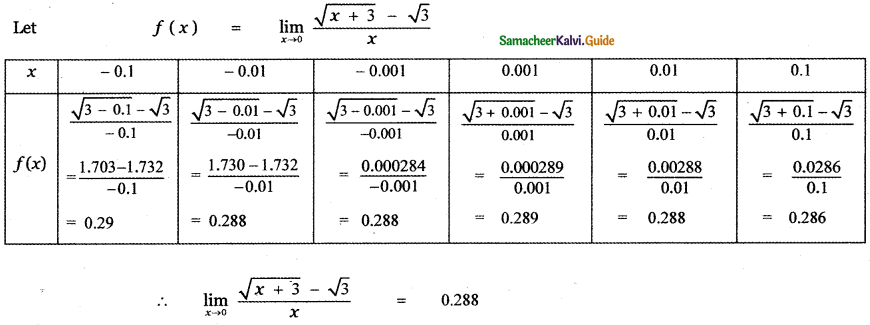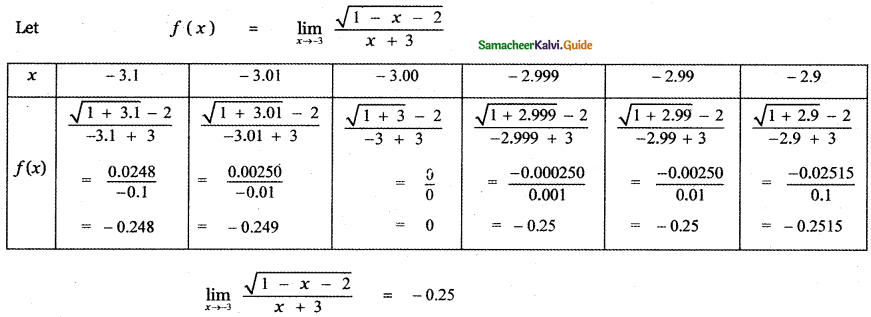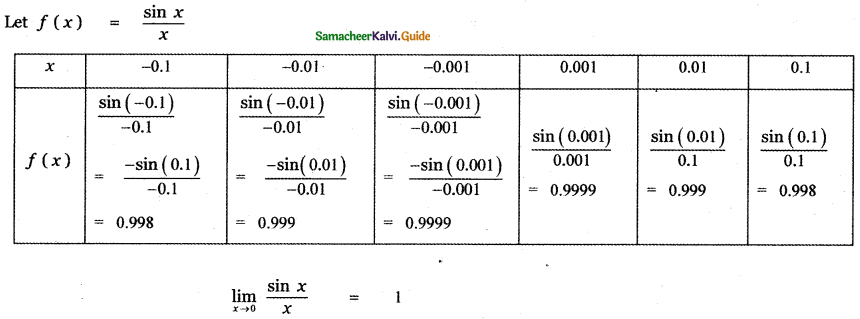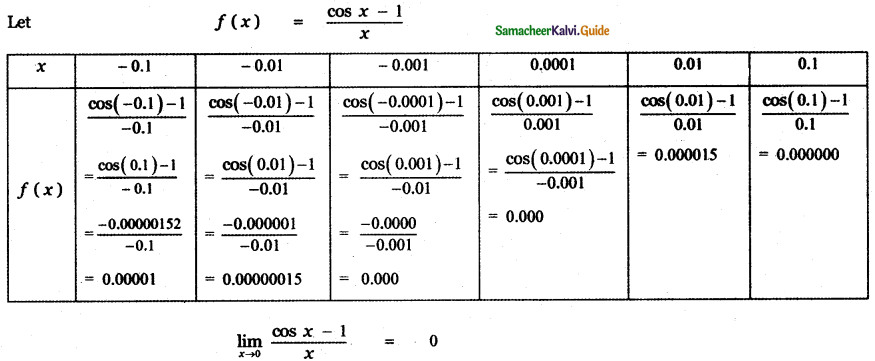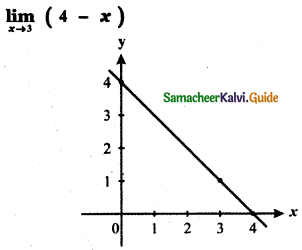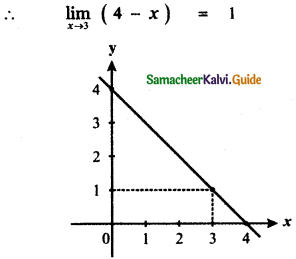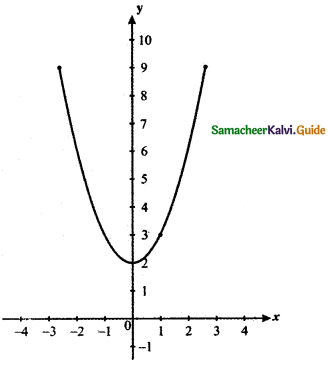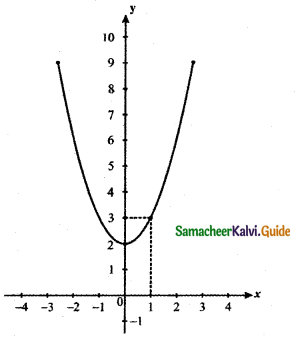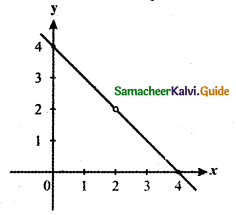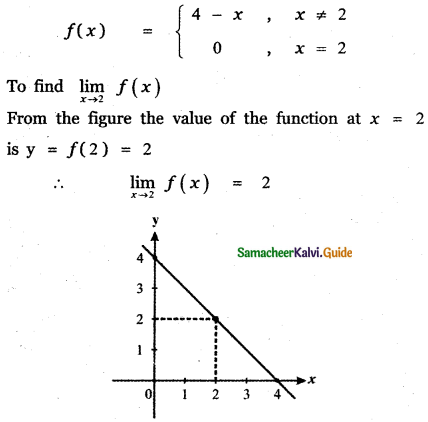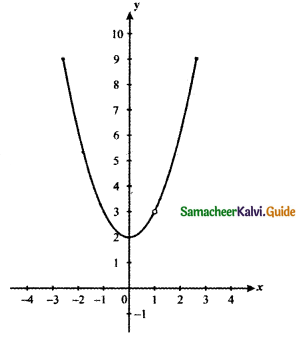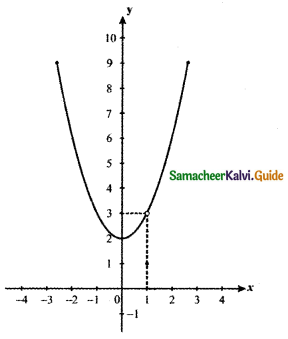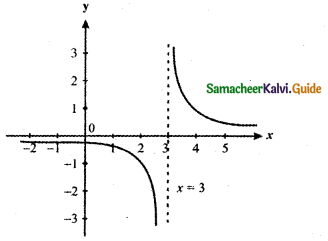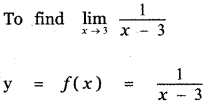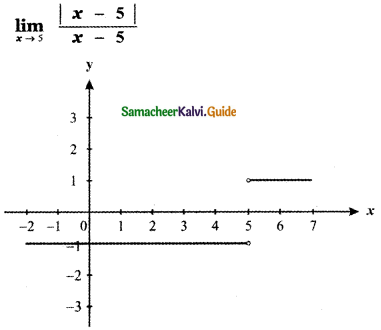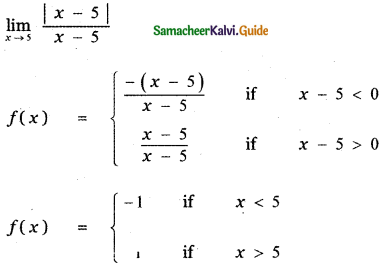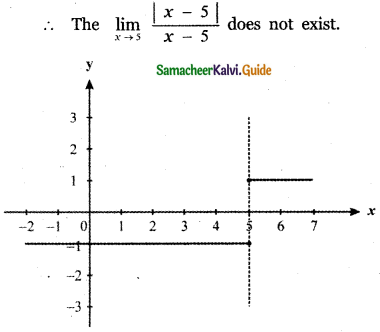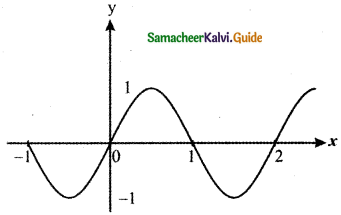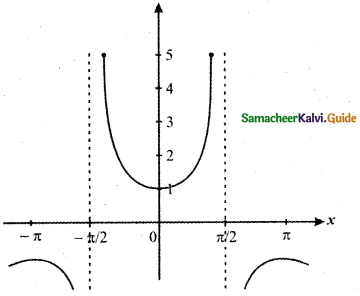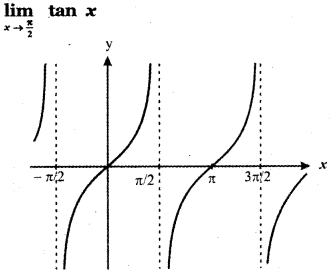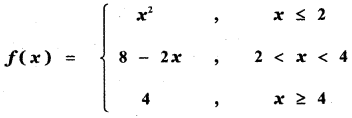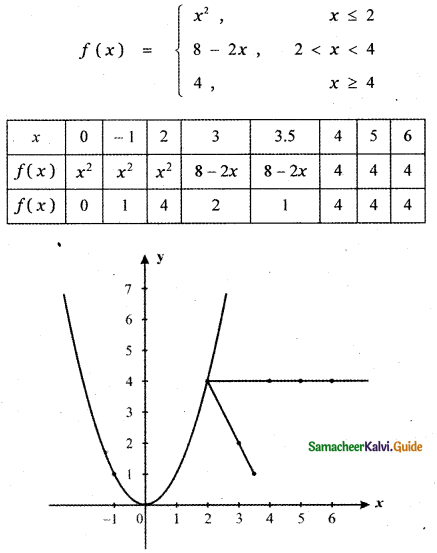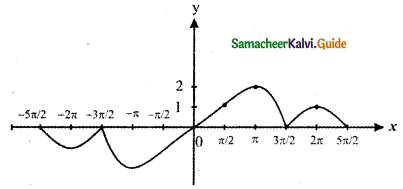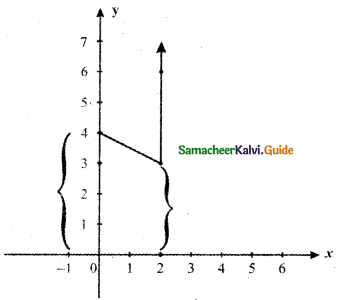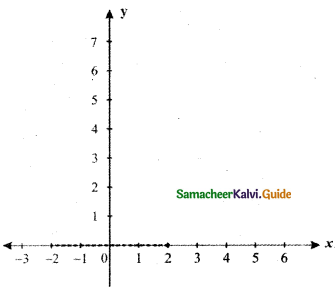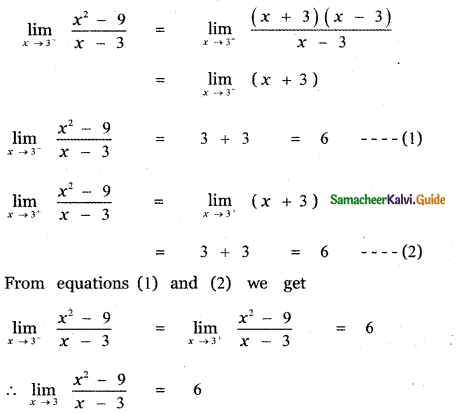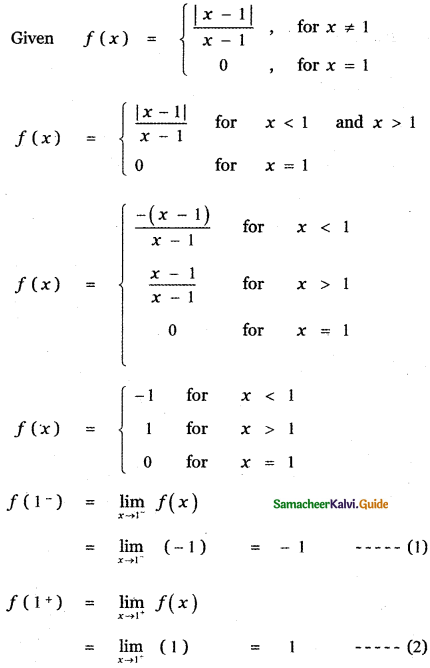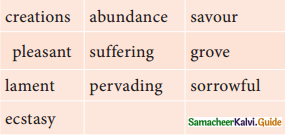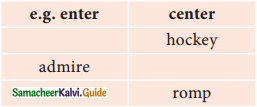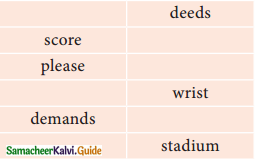Tamilnadu State Board New Syllabus Samacheer Kalvi 11th English Guide Pdf Supplementary Chapter 2 A Shot in the Dark Text Book Back Questions and Answers, Summary, Notes.
Tamilnadu Samacheer Kalvi 11th English Solutions Supplementary Chapter 2 A Shot in the Dark
11th English Guide A Shot in the Dark Text Book Back Questions and Answers
4. Answer the following questions in a Paragraph of about 100 – 150 words:
Question a.
Describe the youth’s strange behaviour when he was in the train.
Answer:
The young man who entered the coach gave out a smothered curse. He was engaged in searching for something elusive angrily and uselessly. From time to time, he dug a sixpenny bit out of a waistcoat pocket and stared at it sadly, then resumed his search. He voluntarily broke the silence. He exclaimed that Mr. Sletherby was-going to Bill Manor. He introduced himself as Bertie, the younger son of Mrs. Saltpen-Jago.
He admitted that he was away for about six months and had not seen his own mother. Making use of the lucky coincidence that he was going to Brill Manor, he asked for a loan of three pounds as he had lost his sovereign purse and was desperately in need of help. He promised to meet him on the subsequent Monday.
“There is no need to suffer silently and there is no shame in seeking help.”
![]()
Question b.
How did Sletherby’s judgment of Bertie turn out to be a wrong one?
Answer:
Philip companion in the train was a young man who was searching for something frantically. The young man introduced himself as Bertie the son of Saltpen Jago. Bertie had left his purse behind after sealing an envelope with crest on the purse. Bertie needed three pounds desperately and asked Sletherby to lend it to him.
He explained that the Saltpen crest was that of a demi-lion. Sletherby pointed out to him that his mother’s letter had a greyhound courant crest. Bertie stated that it was the Jago crest. He further added that his mother’s hair was dark brown similar to his.
Philip had mistaken him for fraud because he knew that Jago had a type of blonde hair. Sletherby sat dumbstruck on learning that Mrs. Honario Saltpen Jago had changed her dark brown hair to a blonde just five weeks ago. Then he realized that his judgment of Bertie turned out to be the wrong one.
Question c.
As Sletherby, would you apologize to Bertie for your rude behavior? Give reasons.
Answer:
Of course, yes. I would earnestly apologize for mistaking Bertie to be a fraud. I would explain the circumstantial evidence which really worked against him. The crest of a greyhound I had found in his mom’s letter and the present altered color of his mom’s hair had clouded my judgment against him. I would admit that I could have offered at least two pounds to help him overcome the problem caused by his carelessness. I would express my regrets for leaving him behind furious and disappointed.
“Life becomes easier when you learn to accept the apology you never got. ”
![]()
ஆசிரியரைப் பற்றி:
ஹெக்டர் ஹியுமன்ரோ (1870-1916) என்பது Saki யின் இயர்பெயர். இவர் ‘சகி’ என்ற புனைப்பெயரை தன் எழுத்துக்களுக்காக வைத்துக்கொண்டார். H.H.Munro என்ற இன்னும் ஒரு பெயரைக் கொண்ட இவர் ஒரு பிரித்தானிய எழுத்தாளர்.
இவரின் எழுத்துக்கள், நகைச்சுவையாகவும், புதினம் நிறைந்ததாகவும், திகியூட்டக் கூடியதாகவும், இங்கிலாந்து நாட்டு அரசர் எட்வர் காலத்து கமூகத்தையும், பண்பாட்டையும் கிண்டல் செய்வதாகவும் அமைந்திருக்கும்.
சிறுகதை எழுதுவதில் மிகச் சிறந்தவர். இவரின் எழுத்துக்கள் O’Henry யின் எழுத்துக்களை ஒப்பிடப்பட்டதாக இருக்கும். இவர் சார்லஸ்மாட் என்பவருடன் இணைந்து The Watched Pot என்ற நாட்கத்தையும் எழுதியுள்ளார்.
![]()
இக்கதையைப் பற்றி:
பிலிப் ஸ்லெதர்பை என்பவர் அரசியல்வாதியாக விரும்பும் நபர். தனக்கு அரசியலில் ஆதரவு கிடைக்க அருகில் உள்ள ஊரில் வசிக்கும் சால்ட்பென் ஜாகோ என்ற மிக பிரபலமான பெண்மணியை சந்தித்து அவரோடு தங்கி விருந்துண்ண இரயிலில் பயணம் மேற்கொண்டார்.
இரயில் பெட்டியில் அவரின் அருகில் ஒரு இளைஞன் இருப்பதையும், அவன் எதையோ தேடிக் கொண்டிருப்பதையும், மேலும் அந்த இளைஞன் சால்ட்பென் ஜாகோவின் இரண்டாவது மகனென்றும், தான் அருகிலுள்ள கிராமத்தில் மூன்று நாட்கள் தங்கி மீன்பிடிக்கப்போவதாகவும், வீட்டில் இருந்து வரும் அவசரத்தில் பணம் எடுத்து வர மறந்து விட்டதாகவும் கூறினான்.
ஆகவே பிலிப் ஸ்லெதர்பையிடம் தனக்கு பணம் தந்து உதவுமாறு கேட்டுக் கொண்டான். அவனிடம் ஸ்லெதர்பை அவன் குடம்பமுத்திரையை கேட்க அவனும் சொன்னான். பின்னர் அவனின் தாயைப் பற்றி கேட்டு தெரிந்து கொண்டார்.
முதலில் பணம் தருவதாக ஒப்புக்கொண்டு விட்டு, பின்னர் இளைஞன் சொன்னது பொய் என்று நினைத்துக்கொண்டு பணம் தர மறுத்துவிட்டார். தன் புத்திசாலிதனத்தை நினைத்து மெச்சுகிறார். ஆனால் இருதியில் இளைஞன் சொன்ன பதில் உண்மையானது என தெரிந்து கொள்கிறார்.
![]()
A Shot in the Dark Summary in Tamil
பிலிப் ஸ்லேதர்பை காலியான இரயில் பெட்டியில் இனிமையான உணர்வுடன் ஏற்றுக்கொள்ளக்கூடிய லாபகரமான பயணம் செல்ல இருந்தார். அவர் Brill Manor என்ற கிரமத்து வீட்டில் தனது புதிய நண்பரான Mrs.Saltpen – Jagoவின் வீட்டிற்க்கு பிலிட் ஸ்லெதர்பி பயணமனார். திருமதி.
சால்ட்பென் ஜகோ லண்டன் மாநகரில் ஒரு முக்கிய நபராக மதிக்கப்படுபவர். மிகவும் முக்கியமாக Chalkshire நாட்டில் செல்வாக்குடன் இருப்பவர்.
அந்த நாட்டின் கிழக்கு வட்டாரத்திற்கு Philip Sletherby மீது தனிப்பட்ட ஈர்ப்பு உண்டு. தற்போது உள்ள அரசின் சட்ட சபையில் ஒருவர்,மற தேர்தலை விரும்பாத நபர், அந்த கூட்டத்தில் Sletherby ஒரு வெற்றியாளராக பேசப்படுபவர். அவருக்கு யோகம் இருந்தால் அந்த பதவி கிடைக்கும்.
Mrs.Saltpen Jago செயல் கண்டிப்பாக ஒரு தாக்கத்தை ஏற்படுத்தும். அரசியல் தலைவர்களுக்கு சிறிய தோழமைக்கான உணவு விருந்து Honorio வில் நடத்தப்பட்டது. அப்போது அங்கு அவர் Saltpen Jago வை பார்த்து ஆனந்தமடைந்தார். அவள் அவரை வெள்ளி முதல் செவ்வாய் வரையிலான நாட்களில் தனது நாட்புற விருந்தினர் இல்லத்தில், விருந்திற்க்கு வருமாறு அழைத்திருந்தாள்.
![]()
மிகவும் நன்றிக்குரியதாக இருந்தது. அவர் கட்டாயமாக அவளுடைய ஆதரவையும் அவரது பதவிக்கான உத்தரவாத்தையும் தக்கவைத்து கொள்ள வேண்டும். அவர் அவ்வாறு செய்ய தவறிவிட்டால் சாதாரண தலைவர்கள் அவரிடம் உள்ள ஆர்வத்தை குறைத்து கொள்வார்கள்.
பிளாட்பாரத்தில் அதிகமாக பயணிகள் அவர்களுடைய ரயிலை எதிர்பார்த்து காத்திருக்க Sletherby தனக்கு கட்சிக்காரர் ஒருவரை கண்டறிந்து (espied) அவனை ஜன்னல் ஓரம் அழைத்து பேசினார். ஓ, நீங்கள் Mrs Saltpen Jago வுடன் வாரத்தின் இறுதி நாட்களை கழிக்க போகிறீர்களா?
உங்களுக்கு நல்ல நேரம் இருக்கிறது . விருந்து அளிப்பதில் அவர் புகழ்பெற்றவர். அந்த சட்டசபையின் திட்டத்திற்கு உனக்கு உதவியாக இருப்பாள். சரி நான் போய் வருகிறேன்.

Sletherby அவர் நண்பரை அனுப்பிவிட்டு ஜன்னலை மூடிவிட்டு, தன் மடியில் இருந்த பத்திரிக்கையில் தன் கவனத்தை கொண்டு சென்றார். இரண்டு தாள்கள் கூட படித்திருக்காத நேரத்தில், மற்றொருவர் அந்த பெட்டியில் இருப்பதை பார்த்தார். பயணத்தில் அவரோடு இருப்பவர் சுமார் இருபத்து இரண்டு வயது மதிக்கத்தக்க ஒரு வாலிபர்.
![]()
கருமையான முடி, வெள்ளை நிற தோற்றம், பட்டிக்காட்டில் உள்ள பைத்தியக்காரன் போல இருந்தது அவன் தோற்றம். அவன் தீவிரமாக ஒரு பொருளை தேடுவதில் ஈடுபட்டு கொண்டிருந்தான். நேரத்துக்கு நேரம் தன் பையில் உள்ள ஆறு அனாவை எடுத்து கவலையோடு பார்த்து கொண்டிருந்தான்.
அடுத்து இவையனைத்தையும் பார்த்த நான் சிகரெட் பாக்ஸ் தீப்பெட்டி, சாவிகள், வெள்ளி pencil பெட்டி, மற்றும் ரயில் டிக்கெட் அனைத்தையும் எடுத்து அருகில் உள்ள இருக்கையில் போட்டேன். இதில் உள்ள எதுவும் அவனுக்கு நிம்மதி அளிக்கவில்லை.
அவன் அவனை முன்பைவிட இப்போது கொஞ்சம் சத்தமாகவே திட்டிக்கொண்டான். அவனது கொடுரமான கொஞ்சம் அதிகமான குணங்கள் எதையும் Sletherby கண்டுகொள்ளாமல் அவரது பத்திரிக்கையை மறுபடியும் வாசிக்க தொடங்கினார்.
”நீங்கள் Mrs Saltpen Jagoடன் Brill Manor ல் தங்க போகிறீர்கள் என்று சொன்னதை நான் கேட்டேன் என்று அவன் ஆச்சரியத்துடன் சொன்னான். என்ன ஒரு சந்திப்பு!” என்ன ஒரு பொருத்தம்! அவர்கள் என் அம்மா திங்கள் கிழமை மாலை நான் அங்கு இருப்பேன். அப்போது நாம் சந்திக்கலாம். நான் இன்னும் உங்களுக்கு யார் என்று அறியாதவன் தான்.
ஆறுமாதங்கள் நடந்த விஷயமாவது தெரியுமா? என் அம்மாவைப் பார்த்து பல நாட்களாகிறது. இவ்வளவு நேரம் சுற்றி வந்திருக்கிறேன். நான் மிகவும் அறுவருப்பான செயலை செய்து விட்டேன். ‘நீ ஒன்றை தொலைத்துவிட்டாய் அப்படித்தானே?” Sletherby வினவினார்.
![]()
அப்படியேதும் இல்லை , நான் வரும் போது பணப்பையை (sovereign purse) எடுத்து வர மறந்துவிட்டேன். அதில் நான்கு பவுண்ட் காசு இருந்தது. எனது மொத்த சொத்தும் அது தான். அது என் பாக்கெட்டில் இருந்தது. இப்போது தான் நான் தொடங்கினேன். பிறகு ஒரு கடிதத்தில் seal வைக்க வேண்டி இருந்தது. அப்போது அந்த பை எனக்கு பொக்கிஷம் போல் இருந்தது. அதை எடுத்து ஸ்டாம்ப் seal செய்தேன்.
இரட்டை வடிகட்டிய முட்டாள் போல் அடுத்து அதை டேபிளில் வைத்தேன். வெள்ளி காசுகள் கொஞ்சம் இருந்தது. ஆனால் Taxi மற்றும் டிக்கெட் எடுத்ததில் இருந்த ஆறு காசுகள் (sixpenny) மட்டுமே மீதம் உள்ளது. நான் மூன்று நாள் ஒரு விடுதியில் தங்கி மீன் பிடிக்கப் போகிறேன். என்னை அங்கு யாருக்கும் தெரியாது.
என் வார இறுதி கணக்கு உபயோகிப்பவர்க்கு கொடுக்கும் காசு, மற்றும் வண்டி வாடகை, நிலையத்தில் இருந்து வந்தது, என்னுடைய Brill டிக்கெட், எல்லாம் எப்படியும் இரண்டு அல்லது மூன்று பவுண்ட் இருக்கும் அப்படிதானே.
அதனால் எனக்கு பத்து பவுண்ட் மற்றும் மூன்று காசு நீங்கள் தந்து உதவினால் நன்றாக இருக்கும். அது என் நெறுக்கடியிலிருந்து காக்கும் என்றார். “நான் அதை கொடுக்கமுடியும் என நினைக்கிறேன் ” என்று Sletherby சிறுது நேரம் கழித்து கூறினார்.
![]()
மிக்க நன்றி, மிகவும் மகிழ்ச்சி இது உங்கள் நல்ல மனதைக்காட்டுகிறது. எனது அம்மாவின் நெருங்கிய நண்பரை சந்திக்க வாய்ப்பு இருக்கிறது. “தனியே பணத்தை விட்டு எங்கும் செல்ல கூடாது” என்பது எனக்கொரு பாடம். அது என் பாக்கெட்டில் இருக்க வேண்டும். இது எல்லாருக்கும் தெரிந்த ஒன்று தான். நமக்கு ஏற்றது போல் பொருளை மாற்றக் கூடாது.
தேவை இல்லாமல் அதை மாற்ற நினைக்க கூடாது. இப்போதும் பணப்பையில் எனது அடையாளம் உள்ளது” என்றார். “சரி உன்னுடைய அடையாளம் என்ன? என்று Sletherby கேட்டார். ”சாதாரணமான ஒன்று இல்லை ” என வாலிபன் கூறினான். ஒரு சிறு சிங்கம் கிராஸ் குறுக்கு போன்ற அடையாளத்தை காலில் வைத்திருக்கும்.
உனது அம்மா ” எனக்கு எழுதிய கடிதத்தில் ரயில்களில் குறிப்பை கொடுத்தார். நான் யோசிப்பது சரி யென்றால், அவள் புத்தகத்தில் உள்ள அடையாளம் ஒரு சாம்பல் நிற வேட்டை நாய்” Sletherby கவனித்தார். அவரது குரலில் ஒரு நடுக்கம் இருந்தது.
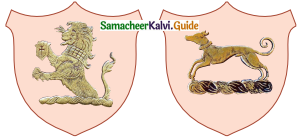
”அது Jagoவின் முத்திரை ” அந்த வாலிபன் பதில் அளித்தான், அந்த சிறு சிங்கம் Saltpenனின் முத்திரை” எங்களுக்கு இரண்டையும் உபயோகிக்க அதிகாரம் உண்டு. நான் சிறு சிங்கத்தை தான் உபயோகிப்பேன்,. ஏனெனில் நாங்கள் உண்மையான ஸால்ட்பென்கள்.
சிறிது நேரம் அமைதி நிலவியது. அந்த வாலிபன் மீன் பிடிக்க தேவையான பொருளை (tackle) சேகரித்து கொண்டிருத்தான்.
![]()
”நான் உன் அம்மாவிடம் பலமுறை உரையாடி இருந்தாலும் ஒரு முறை கூட அவர்களை சந்தித்ததில்லை” என்றார், என்னுடைய அறிமுகம் அவளுடன் அரசியல் மூலமே. அவள் உன்னைப்போல் இருப்பாளா? நான் platform-ல் அவளைக் கண்டால் அடையாளம் காண வேண்டும்.
அவர்கள் என்னைப்போல் இருப்பார்கள். என்னைப் போலவே கருஞ்சாம்பல் முடி மற்றும் நல்ல நிறம். அது உங்கள் குடும்பத்தில் ஓடுகிறது. “இது வெளியே செல்லும் தருணம்” என நினைக்கிறேன். ” போய் வருகிறேன்” என Sletherby கூறினார்.
“நீங்கள் அந்த மூன்று பவுண்டை மறந்து விட்டீர்கள்”. அந்த வாலிபன் கூறினான் அவனது பெட்டி கதவை திறந்து விட்டு அவனது பொருட்களை வெளியே தள்ளினான்.
“உனக்கு மூன்று பவுண்ட் மற்றும் மூன்று சில்லிங் தர எனக்கு விருப்பம் இல்லை.” Sletherby கூறினார் “ஆனால் நீங்கள் கூறினீர்கள்……’
ஆம் உனது கதையை கேட்டதும் எனக்கு சந்தேகம் எழுந்தது. உனது அடையாளத்தின் வித்தியாசத்தை உனக்கு சிறப்பாக சொல்ல தெரியவில்லை. பிறகு உனக்கு வலை விரித்தேன். உனது அம்மாவை பார்த்ததில்லை என்று கூறினேன். நான் அவளை கடைசி திங்கள் கிழமை சந்தித்தேன். அவர்கள் தங்க நிறமுடியில் வித்தியாசமாக இருந்தார்.
ரயில் நகர, Saltpen Jago குடும்ப கௌரவத்தை நடைமேடையிலேயே திட்டி தீர்த்துவிட்டு சென்றார்.
![]()
”ஆம், அவர் ஒரு வித்தியாசத்தை பிடித்துக்கொண்டு அவரது மீன்பிடி கதையை என்னிடம் சொல்லி இருக்கக் கூடாது”. Sletherby சிரித்தார். அவரின் பொழுது போக்கு ஒரு சுவாரஸ்யமான கதையை மாலை நேரம் உணவின் போது சொல்வார். அவருடைய கூர்மையான வலைவீச்சு அவருக்கு கைத்தட்டு பெற்றுத்தரலாம்.
“வளம் மற்றும் புத்தி கூர்மை பெற்ற மனிதன் என்று அவர் இன்னும் சொன்னார். அவர் கற்பனைகளின் சாகசம் அவரது உணவின் பார்வையாளரை இழுக்கும். நடைமேடையில் ஒரு உயர்ந்த மனிதன் கனிவாகவும் ஆர்வமாகவும் இவரை வரவேற்றார். K.C அவரை அதே வண்டியில் தான் பயணம் புரிந்துள்ளார்.
”வணக்கம் sletherby! நீங்கள் பிரில்லில் இந்த வார நாட்களை செலவழிக்க போகிறீர்களா. மிக நன்று. நாளை ஒரு சுற்று Golf விளையாடலாம். உங்களுக்கான பதிலடியை Hoylakeல் கொடுப்பேன் …அது கேவலமாக இருக்காது.
கிராமங்கள் வழியே செல்லம்போது உந்த அசம்பாவிதமும் நடக்காது. ஓ! இங்கே தான்; நமக்காக காத்திருக்கும் கார், நன்றாக உள்ளது, அப்படித்தானே”.
K.C வைத்திருக்கும் இந்த கார் மிகவும் விலையுயர்ந்த வண்டி ஆகும். நேர்த்தியான, சௌகர்யமான மற்றும் லோகோ மோடிவ் ஆற்றல் கொண்டது. அதன் நயமுள்ள கோடுகள் மற்றும் வடிவங்கள் எண்ணற்ற விதத்தில் சக்கரங்கள் கொண்டு அமைந்த வாகனம். ஹோட்டல் லவுஞ்சில் நிற்கும் வாகனம் போல் காட்சி அளித்தது.
”குதிரைகள் இழுக்கும் பலவிதமான கார்களை எனது தாத்தா உபயோகித்தார், அப்படித்தானே “, வழக்கறிஞர் கூறினார். Sletherby தெரிந்துகொள்வதற்காக இதன் குணங்கள், அதன் அமைப்பு மற்றும் செயலாற்றும் தன்மை அனைத்தையும் அவர் கூறினார்.
![]()
Sletherby யாரையும் கவனிக்கவில்லை. அவரிடம் விவரிக்கும் (expounded) அனைத்தையும் அவர் கவனிக்கவில்லை. அவரது கண்கள் கதவை நோக்கி இருந்தது. அங்கே இரண்டு முத்திரை இருந்தன. சாம்பல் நிற courant மற்றும் சிறு சிங்கம் காலில் குறுக்கு சிலுவை வைத்திருந்தது.

K.C இவரின் மௌனத்தை கண்காணிக்கவில்லை. ரயில் பயணத்தின் ஒரு மணி நேரமும் அமைதியாக இருந்தார். அவரது நாக்கு அவருக்கு பேச நேரமும் அளிக்கவில்லை . அரசியல் பேச்சுகள், பொது விஷயங்கள் பொதுவாக அரியப்பட்ட விஷயங்கள் என அனைத்தும் அவரிடம் இருந்து பொழியப்பட்டது.
கார் கிராமபுற சாலையில் போய் கொண்டிருந்தது. Dublin கூலிகளின் வேதனைகள் prince Designate of Albania (அல்போனிய இளவரசன்) பொது வாழ்வு பற்றியும், சான்விட்சிலிரந்து ஒன்பதாவது துளையில் நடந்த Sandwich விஷயங்கள் பற்றியும் கூறினார். Dutchess of Pathshire டங்கோ Tea பற்றியும் கூறினார். Brill கதவுகளில் கார் நுழையும் போது K.C அவரை பார்த்தார். அவர் பணியாளர்களின் குணங்களை பார்த்தார்.
![]()
“அறிவார்ந்த பெண், நன்றாக யோசிப்பவர். தெளிவாக தனிநபரை எங்கு ஏற்ற வேண்டும் இறக்க வேண்டும் என அறிந்தவர். செல்வாக்குடைய பெண். ஆனால் ஓய்வில்லாத வேலையால் அவளை கெடுத்து கொள்கிறாள். கடினம் ஏதும் இல்லை. நல்ல தோற்றம் கூட, இன்னும் அந்த காரியத்தை செய்கிறாள்.”
“மாற்றம்?” Sletherby மொழிந்தார்,”என்ன மாற்றம்?”
“என்ன மாற்றம்? நீ சொல்ல தேவையில்லை. ஓ, இப்போது தான் அவளை பார்த்திருக்கிறாய். அவள் அழகிய அடர்ந்த Brown முடி கொண்டவள். அது அவள் நிறத்திற்கு பொருந்தியுள்ளது; ஒரு நாள், ஐந்து வாரம் கழித்து, எல்லாருக்கும் அதிர்ச்சி கொடுத்தார். அழகிய மஞ்சள் நிற முடியில் (blonde)வந்தார். இதோ வந்துவிட்டோம். உனக்கு என்ன ஆயிற்று? நீங்கள் நோய் வாய்ப்பட்டிருக்கிறீர்கள்.
